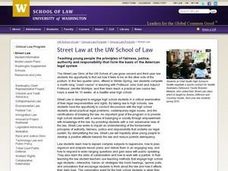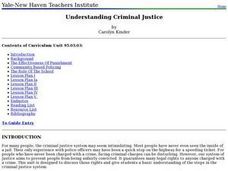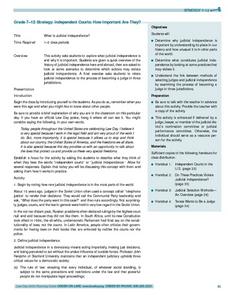Curated OER
Lesson 4: The Judiciary: A Brief Introduction to the Courts System
Focusing on the judicial branch of government, the fourth instructional activity in this series explores the structure of the US courts system. Beginning with an engaging activity based on the short story The Lady or the Tiger,...
Curated OER
An Introduction to Law
With so many different types of law, it can be difficult for learners to discern which is which! Use a newspaper to give tangible examples of various types of law, including criminal, civil, consumer, family, local, state, federal and...
Curated OER
An Introduction To Law
Students identify 4 branches of law-criminal, civil, consumer, and family. using a newspaper, they locate examples of how laws affect citizens on a daily basis.
Judicial Learning Center
The Judge and the Jury
Unless you are a lawyer, you might not understand just how unrealistic Law and Order and other legal dramas actually are. Here's a great resource to help scholars of criminology gain a more realistic perspective. The lesson outlines the...
Curated OER
Lesson 5: In the Courtroom: Understanding the Players and the Action
Young lawyers put Goldilocks on trial as they develop an understanding of the legal system in the final lesson of this five-part series. After learning about key terms relating to litigation, students are assigned roles and reading...
School Improvement in Maryland
Court Proceedings Civil Cases
What's the difference between civil and criminal law? How do the court proceedings differ in these two types of trials? How do the standards of proof differ? Why do these differences exist? As part of their examination of the...
Curated OER
Introduction to Juvenile Delinquency
Learners discuss cases in which juveniles were convicted of horrific crimes. They answer questions in which there are no right or wrong answers related to juvenile delinquency.
Curated OER
Tort Law
Young scholars study the concept of negligence. They recognize the difference between civil and criminal law and examine the factors that courts consider when considering if there is a duty and whether it has been breached. They argue...
Curated OER
Evaluating Crimes
What is crime? Discriminate between criminal and non-criminal behavior with your scholars by engaging them in potentially heated discussion about various scenarios. A brief definition of the word crime precedes individual analysis of 15...
Curated OER
Understanding Criminal Justice
Learners realize that clear values are a resource of behavior in clarifying needs and wants. They clarify feelings and wants and verbalize ways in which they give up freedom and control in their lives by relinquishing decisions to...
Curated OER
Introduction to Mock Trials
Fifth graders participate in a mock trial and explore the vocabulary of a courtroom.
ConnectED
Crime Scene Investigation
How exactly does a crime scene investigation work? The resource, a unit on criminology, covers everything from the deductive reasoning skills needed for detectives to DNA fingerprinting, all the way to how to gather evidence and bring...
Curated OER
Introduction to Mediation
Students are introduced to the use of mediation in court cases. In groups, they identify the different scenerios that could mediation could be used and discuss other alternatives to a solution. They practice mediating various situations...
BBC
Crime: Justice
Are the juvenile courts fair? Learners read a bit from the classic Oliver Twist to consider how young people are treated and represented when they've been accused of a crime. They read a case study from their books, discuss children's...
Mississippi Bar
The 2018 Mock Trial Case
All rise! Scholars put their skills to the test in a mock trial. Using evidence, photographs, and testimony, they role play the trial in the classroom. Rules of law—and the court room—come to life as the class becomes a place of law!
Curated OER
Judges in the Classroom
Students define the legal meaning of juvenile and identify various ways to treat young offenders. They identify the current philosophy of the Utah juvenile justice system using a true/false worksheet and discussion format.
BBC
Crime
Crime and punishment! Learners discuss the law, civics, and crime in the UK. They brainstorm lists of crimes and possible punishments, complete activities on a website, role-play a Juvenile Court scenario, and try to think of ways they...
Curated OER
Juvenile Justice-Disposition
Learners explore the dispositional hearing as a part of the juvenile justice system. After a brief discussion of the parts of the disposition hearing, students work in groups to review case studies involving juveniles in Utah's justice...
Curated OER
Criminal Law: Rape
Students explore the different degrees and types of rape as defined in the state of Washington. They role-play as prosecutors, defense attorneys, and judges, with one of each in different groups. The attorneys present their cases and the...
Curated OER
Public Trust and Confidence
Students analyze the judiciary system. In this government activity, students participate in a class discussion on methods to prevent unfairness in the Judicial courts.
Utah State Courts
Judges in the Classroom
Class members explore the process of a disposition hearing for juveniles, particularly looking at how the judge decides what sentence the juvenile offender should receive. Task your pupils with evaluating different sample cases provided...
Curated OER
Evaluating Crimes
Learners studey that a crime is something one does or fails to do in violation of a law; or it can also be behavior for which government sets a penalty. penalty.
Curated OER
Independent Courts: How Important Are They?
High schoolers investigate the importance of judicial independence and how it is exercised while conducting research to gather information using different resources. The teacher discusses the importance of Law Day. They also read the...
Curated OER
Search & Seizure Opinion Poll
Students examine federal and state constitutional law relating to search and seizure. They analyze various scenarios, participate in an opinion poll, and discuss difficulties in balancing individual privacy rights with the need to fight...

























